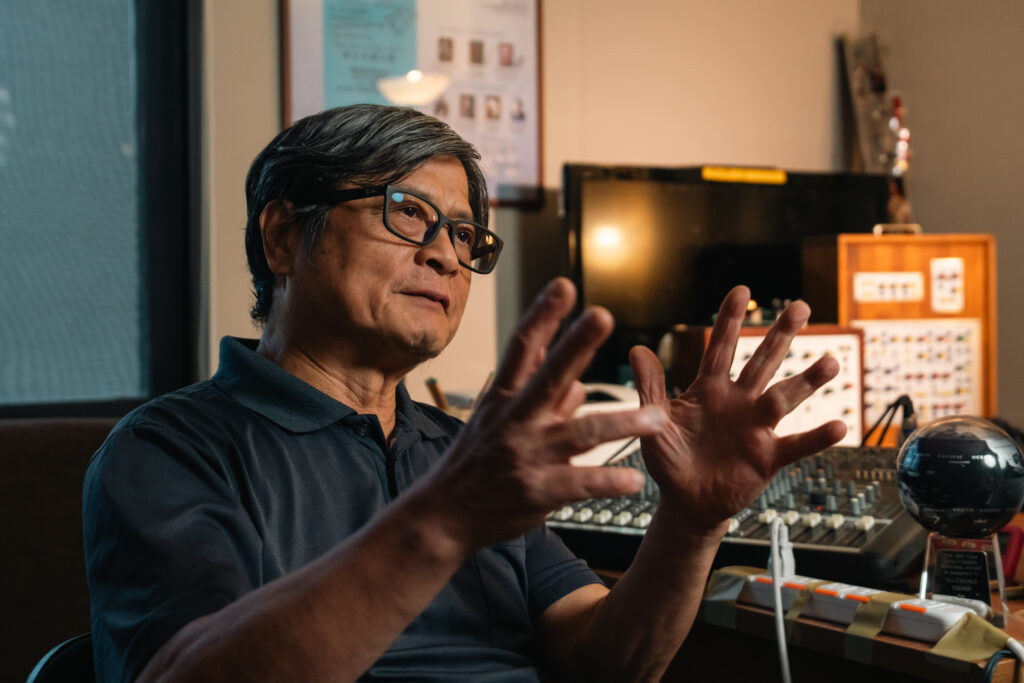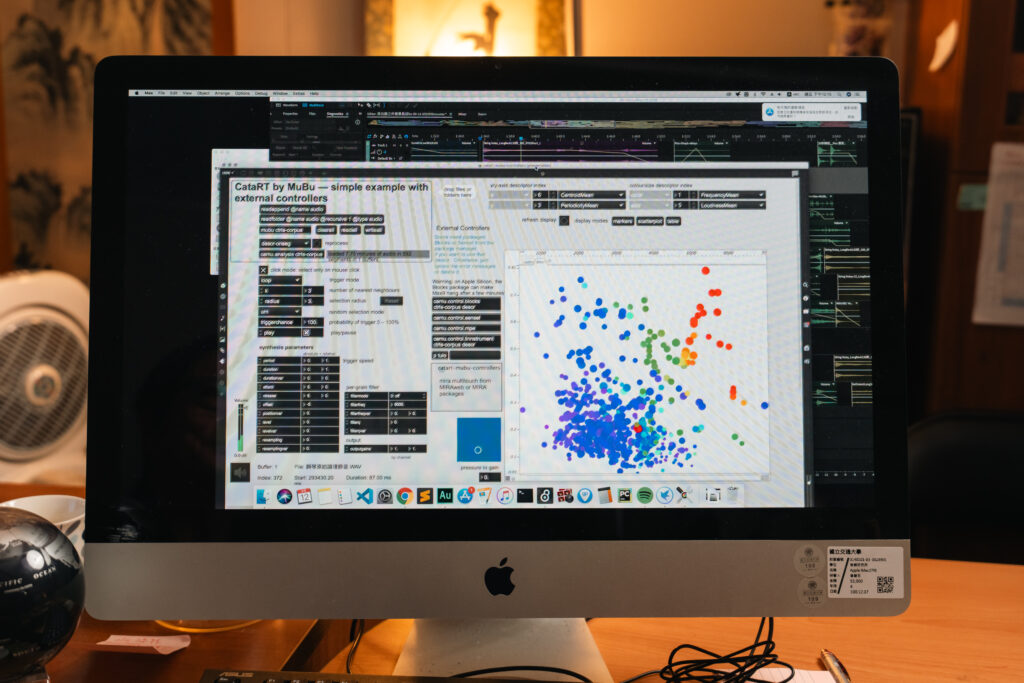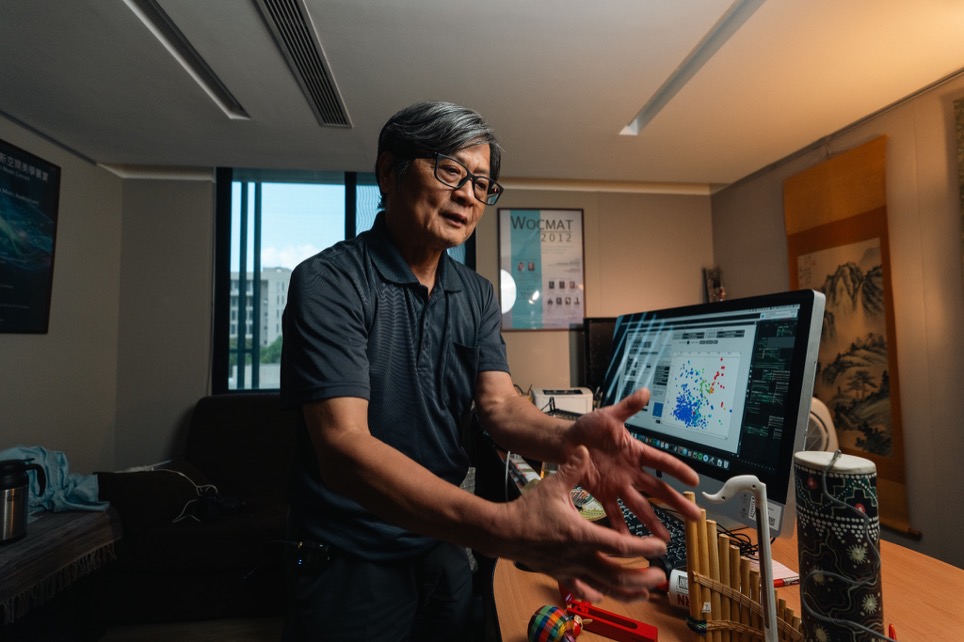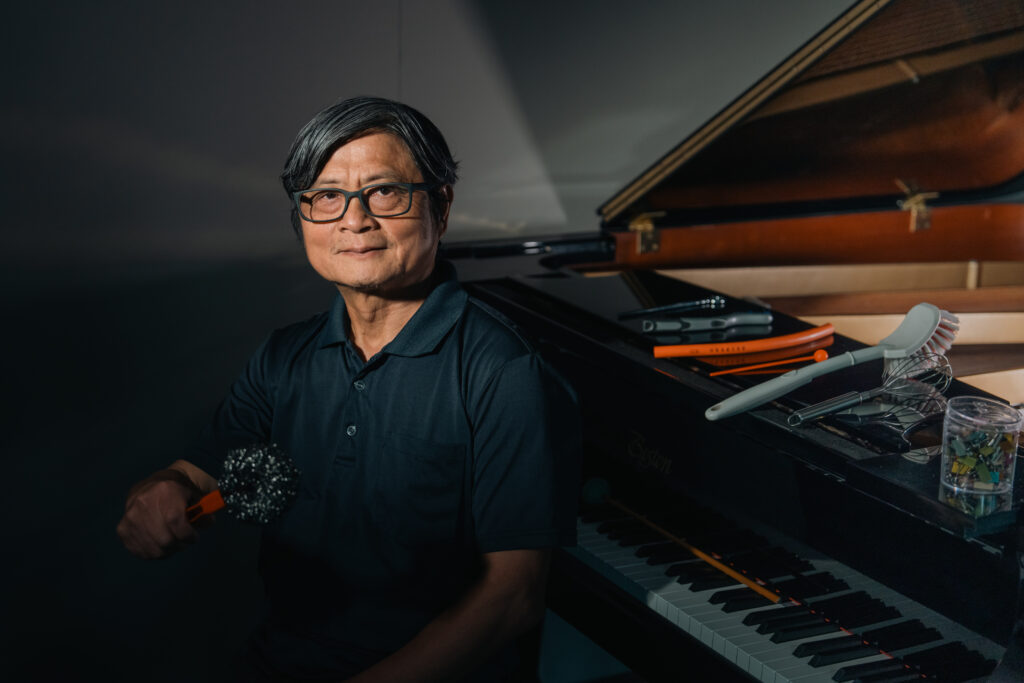▲Professor Yu-Chung Tseng at NYCU’s Institute of Music leads Taiwan’s only computer music program, recently earning the “Best Music Award” at the International Computer Music Conference for his groundbreaking composition, Soundscape beyond black and white.
Although National Yang Ming Chiao Tung University (NYCU) is internationally recognized for its excellence in STEM disciplines such as electronics, electrical engineering, and information science, it has also demonstrated a strong and consistent presence in the humanities and arts, achieving equally remarkable accomplishments in both areas. For instance, as early as 1992, National Chiao Tung University established the Institute of Applied Arts, dedicated to teaching and research in design, communication, and music, among others. Its music program became an independent Institute of Music in 2000, featuring Taiwan’s only computer music major among all music departments in Taiwan. In recent years, the Institute of Music’s computer music program has achieved remarkable international recognition. Professor Yu-Chung Tseng, who leads this program, recently won the prestigious “Best Music Award” with his new composition, “Soundscape beyond black and white,” triumphing over more than 700 submissions from around the globe, at the “International Computer Music Conference (ICMC)”—the world’s premier event in the field this year.
Beyond Memory, Exploring the Possibilities of Sound
“Creators have always sought to discover entirely new sounds and explore the myriad possibilities of sound,” Professor Tseng indicated. The music produced by playing the black and white keys of a piano is already familiar and deeply ingrained in people’s memories. This composition employs over a dozen small tools—such as brushes and drumsticks—to interact with the piano’s internal strings through striking, rubbing, and sliding. The captured sound materials were then re-encoded, synthesized, and restructured via computer. This creates a contrast aesthetic between the traditional, tangible piano tones and the virtual sounds, constructing a unique sonic landscape that transcends the piano’s black and white keys.

Professor Tseng’s style of artistic creation integrates Western algorithmic composition with Eastern philosophical elements like yin-yang and the interplay of real and virtual, has long established him as a perennial winner in international computer music competitions. For example, his accolades include first prize at Italy’s Pierre Schaeffer International Computer Music Competition, first prize at the Czech Republic’s Musica Nova International Electronic Music Competition, second prize at France’s Klang International Electronic Music Competition, and three wins for Best Music Award in the ICMC Asia-Pacific region. The year 2025 marks the 50th anniversary of ICMC. Outstanding from all global submissions to claim the sole “Best Music Award” across all regions represents not only a significant milestone in Professor Tseng’s musical career but also signifies that NYCU and Taiwan have secured a pivotal position in the global computer music landscape, indicating that their strength is unshakable.
“My introduction to computer music began when I worked as a research assistant at National Chiao Tung University,” Professor Tseng recalls. In the late 1980s, the university established the Applied Arts Laboratory and invited Professor Phil Winsor from the Department of Music at the University of North Texas to Taiwan to guide the research and promote computer music. The university subsequently hosted multiple national computer music workshops and concerts, solidifying its position as a leading stronghold for computer music development in Taiwan. Freshly graduated from the university’s music department, Professor Tseng served as a research assistant in the laboratory, witnessing this historic moment firsthand. From then on, he plunged headfirst into the world of computer music. After earning his doctorate in music in the United States, he followed in Professor Phil Winsor’s footsteps, joining the National Chiao Tung University’s Institute of Music to engage in teaching, research, and promotion of computer music.

Cross-Domain Integration Broadens the Path of Music
“Majoring in computer music is no easy feat. Students must be able to compose music while also mastering programming—including cutting-edge AI programming and related technological applications. It seems those mastering computer music truly need to be well-rounded in both ‘arts and sciences’!” Through Professor Tseng’s step-by-step, “hands-on” teaching approach, students often quickly overcome technical obstacles in computing and programming. His advisees frequently receive recognition at international computer music major events. For instance, in 2024, three students had their works selected for performance in the ICMC concert; four students won awards in the Electronic Music Competition held in four countries—France, Taiwan, Canada, and Japan. In 2025, eight students had their works selected for the New York Electronic Music Festival. “When learning computer music, an international perspective is crucial—it’s not just about working in isolation. As an advisor, it’s vital to ensure students truly grasp global development trends and composition tendencies. This is why our students consistently gain international shortlisted and awards,” Professor Tseng added.
Compared to art universities, Professor Tseng believes that NYCU is particularly suited for developing computer music due to its departments in computer science, electrical engineering, and other STEM fields. Following the merger with National Yang Ming University, it has also collaborated with its medical departments to explore brainwave-controlled music and music synthesis. Professor Tseng pointed out that computer music represents a cross-disciplinary integration of music and technology. Students in both the Musicology and Performance programs at the Graduate Institute of Music at NYCU have expanded opportunities to take interdisciplinary elective courses in computer music or contemporary music, enabling them to cultivate cross-disciplinary expertise such as computer music composition, digital editing, and design etc.
Because of this, the career paths of graduates from the Institute of Music at NYCU are broader and more diverse than those of students from traditional music departments. “While some of our graduates teach at arts universities, several work as sound engineers and multichannel designers at CLAB_Taiwan Sound Lab, a subsidiary of the Ministry of Culture. Others have formed teams to create multichannel and immersive multimedia designs for events like lantern festivals and expositions. There are even graduates working as engineers on sound chips and sound synthesis for computer companies. Through computer music education, we cultivate cross-disciplinary talents who understand music, programming, and technology. I am honored that my expertise can contribute to Taiwan,” Professor Tseng humbly remarked.

Falling in Love with Creation and Exploding Appreciation
However, Professor Tseng also frankly said that classical music can guide listeners through its notes, tonality, phrasing, and structural design; in contrast, computer music relies on sound, synthesized timbres, and novel concepts of tonal structure, making its acceptance and appreciation threshold higher for the general public. “Strictly speaking, even appreciating Beethoven or Mozart’s sonatas requires a process of learning, training, and understanding before one develops the ability to appreciate classical music. The same concept applies to computer music. However, I personally believe the best way to understand and appreciate any kind of music is to engage in ‘composition’ yourself—to experience the process of building music.”
Professor Tseng recalled leading students on a computer music tour in France, where a local elementary school arranged for first and second graders to attend the performance. They even let the children operate the mixer to perform live multi-channel computer music playback. To everyone’s surprise, the children had a wonderful time. “That feeling was truly wonderful! The French example provided us with great inspiration and a fine model. I hope Taiwan’s music education can incorporate a bit more creativity, integrating computer music composition courses from elementary school through junior high and senior high school.” “In fact, computers are so advanced now that they’ve significantly lowered the barrier for creation. You don’t even need sheet music to compose. This allows interested teenagers to quickly dive into the world of computer music.” Additionally, Professor Tseng believes that sounds from many everyday objects can serve as musical materials. Therefore, he suggests that students of computer music courses start by recording the sounds of daily life, then use computer music composition to express their emotions and ideas. Professor Tseng optimistically anticipates that Taiwan’s computer music development and its adoption will accelerate in the coming years because of the increasing number of domestic computer music performances, the annual grand scale of the “C-LAB Sound Festival,” and the growing number of graduates from the Institute of Music at NYCU entering the industry and taking up teaching positions at various educational levels.

AI Co-Creation and the New Future of Computer Music
Regarding the explosive growth of AI today, Professor Tseng believes it holds the potential to bring new opportunities for development in computer music. “While ‘generative AI’ in the past could mimic the creation of a piece of modern computer music, it lacked the spirit of creativity and inspiration. In contrast, today’s ‘agent-based AI’ allows musicians to personally participate in the music generation process of AI machines, making the music sound warmer and more humanized. Because ‘agent-based AI’ functions as an additional performer-agent, when the musician plays their instrument, the AI responds and adjusts in real-time based on live musical input, commands, and rules. It interacts closely with the instrumental melody, fully showcasing a novel form of collaborative creation and dialogue between performers and AI. This brings a brand-new landscape to human-computer interaction (HCI) in computer music.”
Professor Tseng stated that AI music has been designated as the primary focus agenda for ICMC 2025, indicating that the development of AI music is imminent. AI music is undoubtedly the most significant trend worthy of development in the future of computer music art. Therefore, both individual creators or the university can seamlessly align with global trends. Now in his sixties, Professor Tseng remains passionately dedicated to computer music composition. His vision is to extensively collect Hakka soundscapes as creative material over the coming years, launching a computer music creative project that integrates AI technology with Hakka cultural elements to breathe new life into local culture. From the perspective of university development, he not only encourages students to learn AI programming but also hopes that faculty members with expertise in computer science will join the effort. He envisions establishing a university-level AI music research center, enabling NYCU to exert significant and multifaceted influence in the AI era.
Finally, Professor Tseng hopes that computer music at NYCU will continue to grow sustainably and relentlessly pursue cutting-edge excellence upon the solid foundation laid by Professor Phil Winsor, leading Taiwan’s computer music development. Meanwhile, it will enrich the global computer music with Taiwan’s unique voice through diverse forms of international exchange.

NYCU Elite: https://elite.nycu.edu.tw/
NYCU: https://www.nycu.edu.tw/nycu/en/index
Interview | Fu-Kuo Chu
Translation | Yi-Chen Emily Li
Editing | Hsiu-Cheng Faina Chang / StoryLab
Photographer | Hao-Yun Peng and Yen-Yu Shih / ZDunemployed studio
©NYCU ELITE
